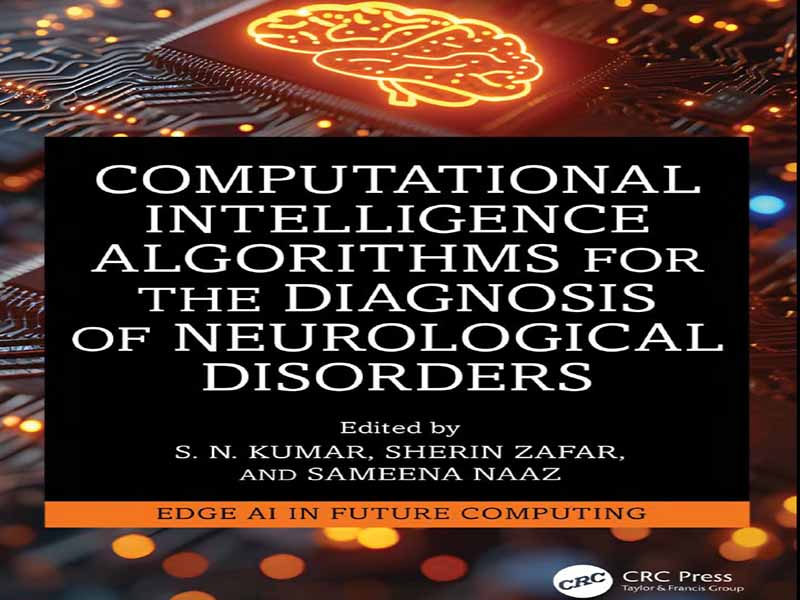- عنوان کتاب: Computational Intelligence Algorithms for the Diagnosis of Neurological Disorders
- نویسنده: S. N. Kumar Sherin Zafar Sameena Naaz
- حوزه: توسعه API
- سال انتشار: 2025
- تعداد صفحه: 353
- زبان اصلی: انگلیسی
- نوع فایل: pdf
- حجم فایل: 5.72 مگابایت
اختلالات عصبی، چالشی مهم و رو به رشد در پزشکی مدرن هستند که میلیونها نفر را در سراسر جهان تحت تأثیر قرار میدهند. با پیشرفت در هوش محاسباتی (CI)، هوش مصنوعی (AI) و یادگیری ماشینی (ML)، شاهد تغییر الگو در نحوه تشخیص، نظارت و مدیریت این اختلالات هستیم. تلفیق روشهای محاسباتی پیشرفته با علوم اعصاب، پتانسیل ایجاد انقلابی در تشخیص زودهنگام، افزایش اثربخشی درمان و ارائه بینش عمیقتر در مورد پیچیدگیهای مغز انسان را دارد. این کتاب، الگوریتمهای هوش محاسباتی برای تشخیص اختلالات عصبی، با هدف ارائه مروری جامع از آخرین تحقیقات و پیشرفتها در این حوزه میانرشتهای نوشته شده است. این کتاب، متخصصان برجستهای از سراسر جهان را گرد هم آورده است تا نقش تکنیکهای محاسباتی را در پرداختن به بیماریهای عصبی مانند بیماری پارکینسون، بیماری آلزایمر، اختلال طیف اوتیسم و تومورهای مغزی و موارد دیگر بررسی کنند. این کتاب که در سه بخش اصلی ساختار یافته است، با مقدمهای بر اختلالات عصبی و چالشهای مرتبط با عصبشناسی محاسباتی آغاز میشود. ملاحظات اخلاقی در تشخیص و درمان اختلالات عصبی نیز مورد بحث قرار گرفته و بر لزوم کاربرد دلسوزانه و مسئولانه هوش مصنوعی تأکید میشود. بخش دوم به بررسی تکنیکهای تصویربرداری عصبی و تشخیصی میپردازد و پیشرفتهای تصویربرداری تشدید مغناطیسی (MRI)، کاربردهای یادگیری عمیق و دارورسانی هدفمند را برجسته میکند. این فناوریها توانایی ما را در تشخیص، طبقهبندی و تجزیه و تحلیل اختلالات عصبی با دقت و صحت بالاتر به طور قابل توجهی افزایش دادهاند. بخش پایانی بر کاربرد یادگیری ماشینی و هوش مصنوعی در تشخیص اختلالات عصبی تمرکز دارد. از مدلهای یادگیری تحت نظارت گرفته تا رویکردهای یادگیری عمیق و یادگیری فدرال، این بخش نشان میدهد که چگونه راهحلهای مبتنی بر هوش مصنوعی، آینده توانبخشی عصبی و مراقبت از بیمار را شکل میدهند. هدف این کتاب، ارائه منبعی ارزشمند برای محققان، متخصصان پزشکی، دانشمندان کامپیوتر و دانشجویانی است که به تلاقی هوش محاسباتی و مغز و اعصاب علاقهمند هستند. با تقویت درک عمیقتر از نقش هوش مصنوعی در علوم اعصاب، امیدواریم در روشهای تشخیصی مؤثرتر مشارکت داشته باشیم و در نهایت نتایج بیمار را بهبود بخشیم. از نویسندگان، محققان و متخصصانی که در این کتاب مشارکت داشتهاند، صمیمانه سپاسگزاریم. فداکاری و تخصص آنها امکان ارائه مجموعهای جامع و آموزنده از دانش را فراهم کرده است. همچنین از حمایت مؤسسات و سازمانهایی که این تلاش را تشویق کردهاند، قدردانی میکنیم. ما امیدواریم که این کتاب الهامبخش تحقیقات و نوآوریهای بیشتر در هوش محاسباتی برای تشخیص اختلالات عصبی باشد و راه را برای پیشرفتهایی که آینده علم پزشکی را متحول خواهد کرد، هموار کند.
Neurological disorders represent a signifcant and growing challenge in modern medicine, affecting millions of individuals worldwide. With advancements in computational intelligence (CI), artifcial intelligence (AI), and machine learning (ML), we are witnessing a paradigm shift in how these disorders are diagnosed, monitored, and managed. The fusion of cutting-edge computational methods with neuroscience has the potential to revolutionize early detection, enhance treatment effcacy, and provide deeper insights into the complexities of the human brain. This book, Computational Intelligence Algorithms for the Diagnosis of Neurological Disorders, aims to present a comprehensive overview of the latest research and developments in this interdisciplinary feld. It brings together leading experts from across the globe to explore the role of computational techniques in addressing neurological conditions such as Parkinson’s disease, Alzheimer’s disease, autism spectrum disorder, and brain tumors, among others. Structured into three major sections, this book begins with an introduction to neurological disorders and the challenges associated with computational neurology. Ethical considerations in neurodisorder diagnosis and treatment are also discussed, emphasizing the need for the compassionate and responsible application of artifcial intelligence. The second section delves into neuroimaging and diagnostic techniques, highlighting advancements in magnetic resonance imaging (MRI), deep learning applications, and targeted drug delivery. These technologies have signifcantly enhanced our ability to detect, classify, and analyze neurological disorders with higher precision and accuracy. The fnal section focuses on the application of ML and AI in neurological disorder diagnosis. From supervised learning models to deep learning and federated learning approaches, this section demonstrates how AI-driven solutions are shaping the future of neurorehabilitation and patient care. The objective of this book is to serve as a valuable resource for researchers, medical professionals, computer scientists, and students interested in the intersection of computational intelligence and neurology. By fostering a deeper understanding of AI’s role in neuroscience, we hope to contribute to more effective diagnostic methodologies and ultimately improve patient outcomes. We extend our sincere gratitude to the authors, researchers, and professionals who have contributed to this book. Their dedication and expertise have made it possible to present a comprehensive and insightful compilation of knowledge. We also appreciate the support of the institutions and organizations that have encouraged this endeavor. We hope that this book inspires further research and innovation in computational intelligence for neurological disorder diagnosis, paving the way for breakthroughs that will transform the future of medical science.
این کتاب را میتوانید از لینک زیر بصورت رایگان دانلود کنید:
Download: Computational Intelligence Algorithms for the Diagnosis of Neurological Disorders



































نظرات کاربران